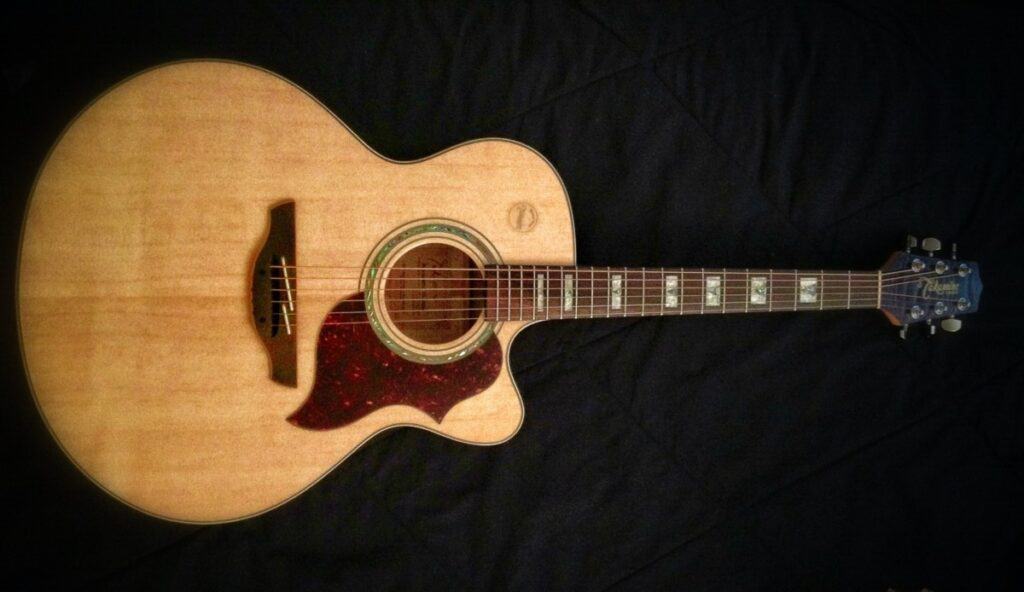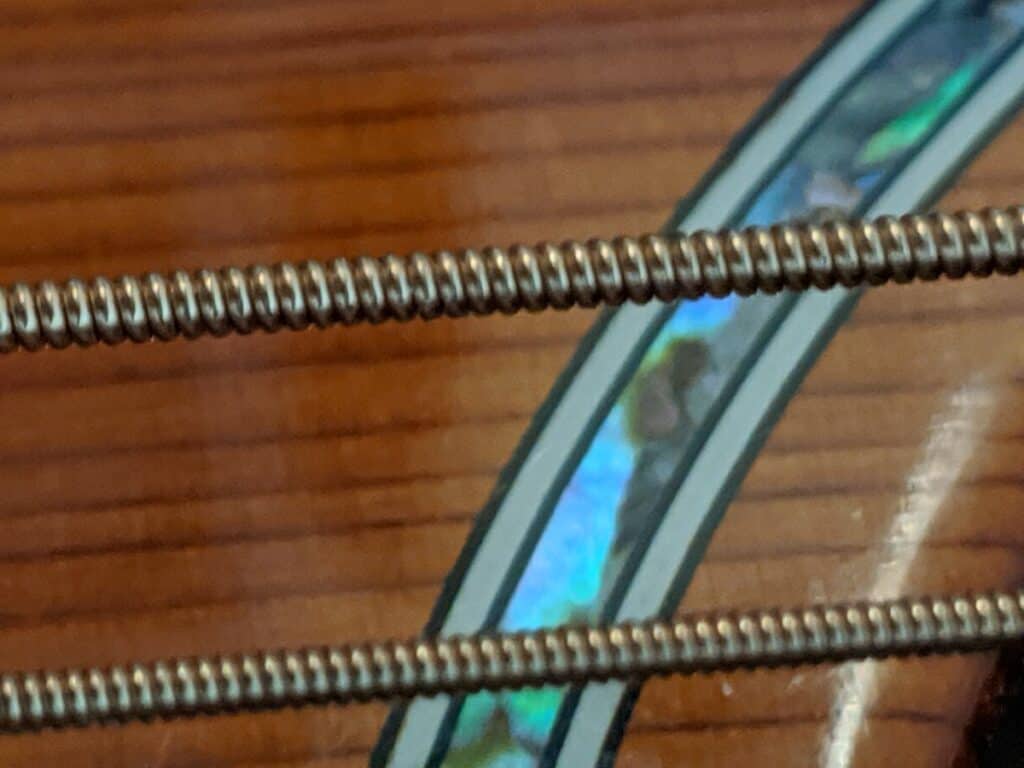This post contains affiliate links. We earn commissions if you purchase products from retailers after clicking on a link from our site. As an Amazon Associate, we earn from qualifying purchases.
I’ve noticed many times when I change my strings that the guitar has a completely different sound, and could definitely be described as bright, “twangy” or “tinny”. This might not be what you want, but what do you do?
Although opinions differ on how exactly to deaden strings, the one way guaranteed to work is to play your strings as all strings sound less bright the longer they are played. Less air-abrasive strings such as flatwounds will also deaden your sound.

By the way, looking for recording equipment and musical instruments? Check out Sweetwater.com for microphones, monitors, audio interface or any other recording gear that you could ever need. (Affiliate Link)
By the way, looking for a guitar? Check out GuitarCenter.com for acoustic, electric, or classical guitars as well as all the guitar gear you could ever need. (Affiliate Link)
When I asked the question as to how to make the sound less bright (or metallic), I decided to research what information was available.
It turns out that it’s controversial! I guess it makes sense because terms like “bright” or “dark” are somewhat subjective. I’ll share what I was able to find that will be useful and give you some things to experiment for yourself.
Play Your Guitar For A Few Hours
During my research I found dozens of string recommendations and some strange techniques (like applying chapstick to your strings). However, the one thing that everyone agreed works 100% of the time is to play your guitar with your new strings.
The too metallic/too bright sound for many guitarists wears off after a few hours of play.
I should say the amount of time before your strings start to deaden will vary due to the guitarist, playing style, and string. Some people say their guitar strings didn’t deaden until a few weeks of consistent playing.
It might be worth finding out for yourself and time it. When is the point that the too metallic sound goes away? If it’s an hour, then maybe it’s okay to put up with. If it’s days, then maybe it’s worth doing something about it. Let’s find out if there are things you can do.
Do Sweaty Hands Make A Difference?
Many guitarists swear that the reason why their strings dull quickly is that they have sweaty hands. It’s hard to really know on this one since usually guitarists aren’t willing to play with and without gloves to make a comparison.
The idea here, presumably, is that the oils and sweat from hands accumulate on the guitar string removing some of the bumpiness from the string, which smooths out the sound.
Some players will intentionally use the oil from their noses to rub onto the strings to accelerate the dulling process. Again, it’s not proven, but at least it’s no skin off your back to try. 🙂
Is that it? The only option is to power through the too metallic sound and play for a couple weeks? Well, there are other options, let’s dig into it.
Trying Different Guitar Strings To Darken Your Tone
If you dislike the sound of your new strings and you don’t want to wait till your strings dull out from being played, the cheapest thing to try are different strings. Different types of strings actually can make a difference so that you don’t have to go through as much of a break-in period.
String sounds can be super subjective. In other words, guitarists will disagree from player to player as to what strings sound brighter and darker.
I’ll share a couple principles that are commonly believed, and then I’ll talk more about the strings that will most likely work for you:
- Phosphor bronze sounds darker than 80/20 bronze (the difference between the two is the percentage of copper to elements in the blend)
- Coated strings sound darker because they remove some of the “bumpiness” and buzz from the string
- Flatwound strings are the mellowest strings
- Nickel Strings sound more mellow than bronze strings
- Silk-and-Steel Strings sound darker because of the silk or silk-like insulation between the wound string and the string core.
- Thicker gauge strings sound darker than lighter strings
Whether you believe in one of these principles or not, the truth is that strings do make a big difference in sound–which makes sense. It is the strings, after all, that is causing the vibration that either causes the guitar to resonate (in an acoustic guitar) or disrupt the electromagnetic field (for an electric guitar).
Let’s start with the most likely type of string to soften the sound.
Flatwound Strings
So, if you weren’t aware, the lower guitar strings are actually in two parts: A (often) steel core wound with another metal. I’ll show you a picture of my guitar’s “roundwound” strings so you can see:

In this picture you can see it’s as if they took a cylindrical wire and wound it very tightly. This style is called “roundwound”.
What’s the purpose of winding the string? Well, if you notice, if you do nothing else, but just play the highest strings on your guitar, it has a much purer sound that is much more bright. While the lower strings have more overtones–in other words, they have more “buzz”.
So what is flatwound? Well, it’s the same principle, but instead of wrapping a round wire around the steel core, they use a flat wire, so there’s less bumpiness between strings.
This effectively means the string, when vibrating, is causing less of a disturbance, which many agree creates a much mellower sound.
I love this demonstration between flatwound and roundwound strings. In my amateur opinion, the roundwound strings do indeed sound brighter (and therefore more metallic) than the flatwound strings. Check it out in this video here:
So, if you really dislike the too bright sound of your new strings, then you might try flatwound strings.
Furthermore, if you want guitar strings that are easier on your fingers, flatwound strings are actually a great option for that too. You can read more about how you can make guitar strings easier on your fingers, here.
What If Flatwound is Too Dull? Any Other Options?
If you’re concerned about making your strings sound too dead from using flatwound strings, there are options in between. You may see “flat-top” strings, or “half-round”. These often mean that the cylindrical wire is simply filed down a bit to give a smoother exposed surface, therefore getting closer to the smooth sound of the flatwound strings.
Coated Strings
Many guitarists recommend coated strings as a way to remove some of that too bright or too metallic sound when you install your new strings. Elixir Polyweb strings are often recommended for this reason. Elixir themselves advertise their Polyweb strings (ZZounds) as their warmest string as opposed to their Nanoweb strings.
I have a set of Elixir Nanowebs (ZZounds) on my guitar, and while they aren’t the warmest Elixir has to offer, I can attest that
- They are great strings, they stay in tune and I’ve had mine on for years without feeling like I’ve needed to change them. That’s besides the point, though.
- They do still have a bright sound when you first install them, but they do dull as time goes on (just like any string). In my opinion, these strings have maintained a more consistent sound over a long period of time then any other strings I’ve used.
Why Coated Strings?
This is where there’s no real data as to whether or not coated strings truly make a huge difference–but presumably the idea is that the coating fills in some of those microgaps in the string, reducing some of the air abrasion or “bumpiness”. The coating is intended to protect the string to make them last longer, but it has a (potential) side-effect of also dampening the tinny metallic sound of new strings.
DIY Coating (Nose Grease?)
As I’ve mentioned, some guitarists go so far as to intentionally put grease on their hands or their strings so they can try and dampen the sound. Chapstick, vaseline, nose grease… pizza… you name it–it’s probably been tried.
Others disagree with this method. You might be able to test it yourself by doing a deep cleaning of your strings to remove any collected material and compare the sound before and after. (Audacity does a sound spectrum analysis if you’re serious about that)
I can’t vouch personally for this method, but the worst that could happen is the aroma of pepperoni might accompany your playing. Which I suppose could detract or enhance your song, depending on the style.
String Material / Build (Nickel/Silk-And-Steel etc)
The realm that is perhaps most controversial in this discussion is to compare different string materials–phosphor bronze vs. nickel vs. 80/20, etc.
Another interesting and not as well-known type of string build is called silk and steel, wherein silk is between the wound wire and the steel core.
Here is a superb video demonstrating D’Addario nickel-bronze strings vs. D’Addario silk-and-steel:
This is where it’s obvious I’m not a guitar string expert, because while I felt like I could tell a difference, I couldn’t tell you which one sounded brighter.
I even plugged the 2nd song through Audacity’s frequency analysis, and found this:


The frequency curve looks extremely similar. The silk and steel recording seems a touch quieter on the mids, and a little bit lower in the very highs.
The frequency curves are similar enough that many players would not be able to pick out the difference, except perhaps that they do sound a little different.
So, what am I getting at? Your mileage may vary. Trying new strings is a cheap way to try and darken your sound. String material and build won’t make a strong a difference as flatwound vs. roundwound strings, but there are definite sonic differences between strings that you may want to experiment with and find what you like.
So, if someone says use pure nickel or try phosphor bronze, take it with a grain of salt, but next time you need strings, it won’t hurt to branch out and try something new. If you want to make sure it’s not in your head, though, make sure and record yourself playing your brand new strings so you can compare between different strings.
Commonly Recommended Strings For Darker Tone
I scoured many forums and players recommended the following strings over and over again as strings that have a warmer sound even when brand new. I’ll list them with links to their Amazon listings so you can check them out:
- John Pearse Phosphor Bronze
- DR Rares: On the back of their package, they advertise themselves as “loud and warm”.
- Martin Monels: Although many guitarists just recommended Monel strings in general, this Tony Rice edition was recommended specifically
- D’Addario Nickel-Bronze
Although I’ve listened to recordings of these strings, it’s impossible to say that any of them are going to match the exact sound you’re looking for right out the gate.
The most important sound is the sound you like. I recommend trying different strings out as you need to replace them–you could almost spend your entire fortune on all the variety of strings out there.
Thicker Strings
Another commonly held belief is that thicker strings have a darker tone than lighter strings.
Again, it’s up to your own ears and experience to really determine this for yourself, but here’s a really good string comparison between .10s and .13s to hear for yourself:
Adjusting Your Tone Controls (Electric Guitars)
So, strings aren’t everything! If you are playing electric guitar then you have another important asset to help you here, and that’s your tone knob.
Built-in to many electric guitars is a the tone knob (it adjusts the mid-high frequency output) that many guitarists want to crank all the way up.
If you are experiencing this problem only with new strings, then you can try adjusting the tone knob down slightly to compensate–and when the strings mellow out you can crank it back up to find the sound you’re looking for.
This isn’t a surefire thing. Every guitar’s electronics are different, and there are still sound differences that are caused by a number of different attributes of the setup that won’t be solved instantly by changing the tone settings.
Amplification is important too–try reducing amplification so that the highs aren’t so overpowering.
Choosing a Different Cable (Electric)
To be honest, I figured that cables wouldn’t make as big a difference as they do. This video is an excellent example how different cables can modify your sound:
Cables are what transmit the signal from your guitar to the rest of the signal chain.
Cables have varying levels of shielding, and many other electrical properties, including capacitance!! That’s right, your cable can actually store a small charge! All of these factors work together to create a different sound from your electric guitar. The video I posted above shows how dramatic those differences can be.
The Monster Jazz cable isn’t sold anymore, but it’s the second cable in this line-up. It definitely has a more muted sound. If you compare it to the Monster Rock cable (the last cable in the rhythm line-up), you’ll hear a much different sound.
Your cable might be contributing to the too bright sound you want to avoid. Another thing to experiment with!
Other Factors
Bridge Pins (Acoustic)
It does make sense that all the components come together to make the sound of the guitar. Even bridge pins are in the line-up.
For a darker sound, I saw that many guitarists recommended ebony pins, but here’s a short video to see the difference between plastic, bone, ebony, TUSQ and brass pins. My brain is telling me there is a difference in the brass pins, but … you know how brains are, sometimes.
Thicker Guitar Pick
As you might imagine, your guitar pick also is a part of this system and can make a difference in the sound of your guitar. Here is another lineup comparing pick differences. These are electric guitar comparisons, which you can still hear the difference between the thinnest and thickest guitar picks:
In general, the thought is that the thicker picks have a more muted and “thud” sound.
Pickups (Electric)
Lastly, another factor in the line-up of things that adjust the sound of your guitar are your pickups. This is going to be a short section because I am not knowledgeable (yet) about the very subtle differences between pickups–there are so many different varieties it’s difficult to know even where to start.
Just know that if your new strings are bothering you with their metallic sound on your electric guitar–the pickups can make a big difference in sound. I have seen cheap pickups do amazingly well, so there’s no real telling whether a certain brand or model of pickups is going to give you the warmth you’re looking for.
Do New Strings Sound Better?
If you’ve gotten to this point in the article, you may be asking yourself, is it worth messing around with all this to get rid of that metallic sound?
The most important part of this is your own perception of your sound. If you don’t like your sound, you probably won’t enjoy playing as much. Ultimately, you are playing for you–so it’s good to figure out what sounds best for you.
However, one thing to remember is that some feel that the new string sound is the best sound! It’s less practical, because buying new strings every time your strings dull out means you’ll be buying at least a dozen string sets every year. But, if you’re worried it sounds bad, then perhaps it might help to remember that some actually prefer it.
So, go forth, find the sound you’re looking for!
